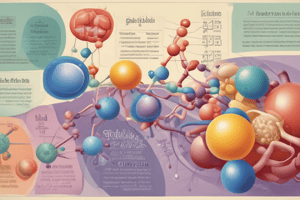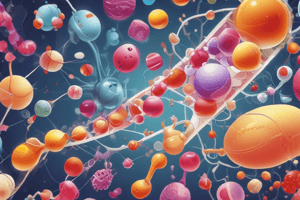Podcast
Questions and Answers
Which vitamin from the B complex family is important for cell division, DNA synthesis, and the formation of red blood cells?
Which vitamin from the B complex family is important for cell division, DNA synthesis, and the formation of red blood cells?
- Pyridoxine (B6)
- Thiamine (B1)
- Pantothenic Acid (B5)
- Folic Acid (B9) (correct)
What is the function of Riboflavin (B2) in the body?
What is the function of Riboflavin (B2) in the body?
- Supports protein metabolism, immune function, and red blood cell production
- Helps in energy production and cellular respiration (correct)
- Involved in the synthesis of hormones and cholesterol
- Aids in carbohydrate metabolism and nerve function
Which nutrient from the B complex family is necessary for energy production and maintaining healthy skin and nerves?
Which nutrient from the B complex family is necessary for energy production and maintaining healthy skin and nerves?
- Niacin (B3) (correct)
- Cobalamin (B12)
- Biotin (B7)
- Riboflavin (B2)
Where can Thiamine (B1) be commonly found among the listed sources?
Where can Thiamine (B1) be commonly found among the listed sources?
Which symptom can be associated with a deficiency in Pyridoxine?
Which symptom can be associated with a deficiency in Pyridoxine?
What is a common source of Biotin?
What is a common source of Biotin?
Which vitamin B complex nutrient is important for red blood cell production?
Which vitamin B complex nutrient is important for red blood cell production?
What benefit is associated with Vitamin B Complex?
What benefit is associated with Vitamin B Complex?
What is the recommended daily intake of Biotin for lactating women?
What is the recommended daily intake of Biotin for lactating women?
A deficiency in Cobalamin can lead to which of the following symptoms?
A deficiency in Cobalamin can lead to which of the following symptoms?
Flashcards are hidden until you start studying
Study Notes
Vitamin B Complex: A Comprehensive Guide
Vitamin B complex refers to a group of eight water-soluble vitamins that play a crucial role in various biological functions. These essential nutrients work in synergy to support the body's metabolism, immune system, and overall health. This article delves into the functions, sources, deficiency symptoms, benefits, and recommended intake of the vitamin B complex.
The Vitamin B Complex Family
- Thiamine (B1) - Aids in carbohydrate metabolism and nerve function.
- Riboflavin (B2) - Helps in energy production and cellular respiration.
- Niacin (B3) - Necessary for energy production and maintaining healthy skin and nerves.
- Pantothenic Acid (B5) - Involved in the synthesis of hormones and cholesterol.
- Pyridoxine (B6) - Supports protein metabolism, immune function, and red blood cell production.
- Biotin (B7) - Required for fatty acid synthesis and glucose metabolism.
- Folic Acid (B9) - Important for cell division, DNA synthesis, and the formation of red blood cells.
- Cobalamin (B12) - Essential for DNA synthesis, nerve function, and red blood cell production.
Sources of Vitamin B Complex
The vitamin B complex is found in a variety of foods, such as:
- Thiamine: Whole grains, legumes, pork, eggs, and nuts
- Riboflavin: Milk, dairy products, liver, green leafy vegetables, and whole grains
- Niacin: Poultry, red meat, fish, eggs, and whole grains
- Pantothenic Acid: Meat, fish, whole grains, legumes, eggs, and vegetables
- Pyridoxine: Whole grains, meat, fish, poultry, and dairy products
- Biotin: Eggs, nuts, whole grains, legumes, and yeast
- Folic Acid: Leafy green vegetables, dried beans, whole grains, citrus fruits, and fortified cereals
- Cobalamin: Animal products like meat, fish, dairy products, eggs, and fortified cereals
Deficiency Symptoms of Vitamin B Complex
Deficiency in one or more vitamin B complex nutrients can lead to the following symptoms:
- Thiamine: Fatigue, muscle weakness, and nerve issues.
- Riboflavin: Cracks in the corners of the mouth, redness and swelling of the lips, and mouth sores.
- Niacin: Mental confusion, depression, and skin lesions.
- Pantothenic Acid: Fatigue, headache, and weakness.
- Pyridoxine: Anemia, skin rash, and nerve issues.
- Biotin: Hair loss, skin rash, and nerve issues.
- Folic Acid: Fatigue, weakness, and pale skin.
- Cobalamin: Anemia, weakness, and neuropathy.
Benefits of Vitamin B Complex
The vitamin B complex plays an essential role in:
- Boosting energy levels
- Supporting immune function
- Aiding in red blood cell production
- Promoting healthy skin, hair, and nails
- Improving nerve function
- Assisting in the production of hormones and neurotransmitters
Recommended Intake of Vitamin B Complex
The recommended daily intake of vitamin B complex varies depending on age and gender:
-
Adults (M/F): Thiamine (1.2/1.1 mg), Riboflavin (1.3/1.1 mg), Niacin (16/14 mg), Pantothenic Acid (5/5 mg), Pyridoxine (1.3/1.1 mg), Biotin (30/30 µg), Folic Acid (400/400 µg), Cobalamin (2.4/2.4 µg)
-
Pregnant women: Thiamine (1.4 mg), Riboflavin (1.4 mg), Niacin (18 mg), Pantothenic Acid (6 mg), Pyridoxine (1.9 mg), Biotin (30 µg), Folic Acid (600 µg), Cobalamin (2.6 µg)
-
Lactating women: Thiamine (1.4 mg), Riboflavin (1.6 mg), Niacin (17 mg), Pantothenic Acid (7 mg), Pyridoxine (1.9 mg), Biotin (35 µg), Folic Acid (500 µg), Cobalamin (2.8 µg)
Conclusion
Vitamin B complex is an essential group of water-soluble vitamins that contribute to overall health and well-being. Consuming a balanced diet, rich in these nutrients, can help prevent deficiency-related symptoms and maximize the benefits of the vitamin B complex. Always consult your healthcare provider before starting supplementation or if you suspect a deficiency in one or more of these essential nutrients.
Studying That Suits You
Use AI to generate personalized quizzes and flashcards to suit your learning preferences.




